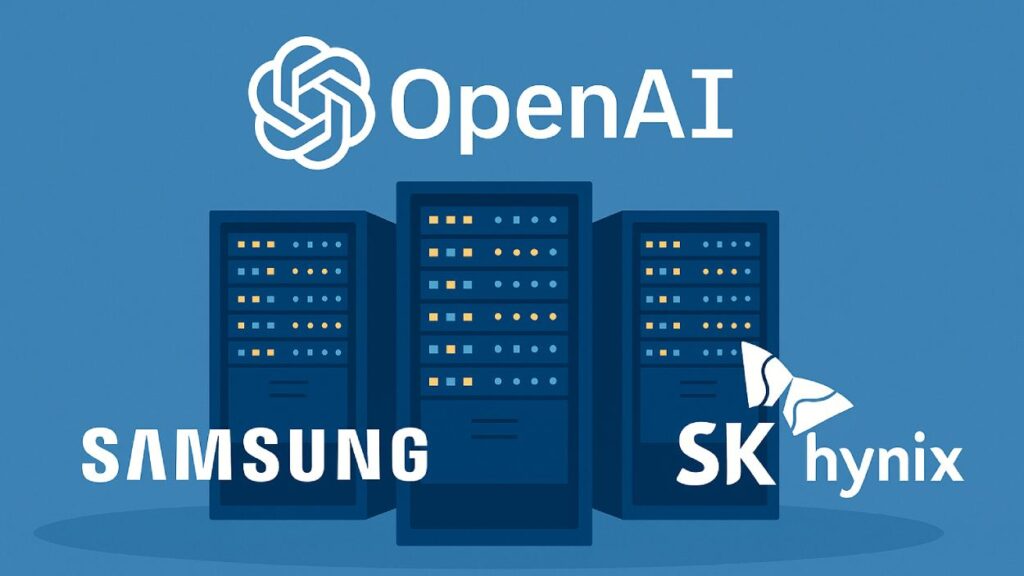OpenAI has sealed a landmark deal with Samsung and SK Hynix to supply memory chips and build data centers as part of its ambitious Stargate project.
TLDR:
- OpenAI signed a chip and infrastructure deal with Samsung and SK Hynix to support the Stargate AI project.
- The agreement includes building two data centers in South Korea and producing 900,000 DRAM wafers monthly.
- The collaboration aims to strengthen South Korea’s role in global AI development and expand OpenAI’s compute power.
- The deal follows recent massive investments by Oracle and Nvidia to boost OpenAI’s infrastructure.
What Happened?
OpenAI has entered into a strategic partnership with Samsung Electronics and SK Hynix to source advanced memory chips and construct new data centers for its Stargate AI initiative. This collaboration, announced after a high-profile meeting in Seoul, is designed to expand AI infrastructure both globally and within South Korea.
The agreement represents a critical step in OpenAI’s mission to scale up compute capacity and solidify South Korea’s growing importance in the AI ecosystem.
OpenAI Taps Korean Chip Power for AI Expansion
OpenAI’s Stargate initiative, launched in January 2025 with partners Oracle and SoftBank, aims to invest $500 billion to build AI-specific data centers across the United States by 2029. Now, with South Korea joining the fold, the scope of the project is expanding globally.
At the center of this deal is the production of 900,000 high-bandwidth memory DRAM wafers per month by Samsung and SK Hynix. This is more than double the current global industry capacity for such chips, underlining the scale and urgency of OpenAI’s infrastructure needs.
According to South Korea’s presidential office, OpenAI is planning to build two data centers in South Korea with initial power capacity of 20 megawatts. These will be part of what some are calling a “Korean-style Stargate,” leveraging the country’s advanced industrial base and its enthusiastic user base of ChatGPT.
A High-Profile Push for AI Leadership
The letter of intent was signed following a meeting in Seoul between OpenAI CEO Sam Altman, President Lee Jae-myung of South Korea, Samsung Electronics Executive Chairman Jay Y. Lee, and SK Chairman Chey Tae-won.
Altman praised Korea’s unique industrial capabilities, stating, “Korea has an industrial base like nowhere else in the world that is critical for the development of AI.” He emphasized the importance of memory chips in meeting global AI demands, noting that Samsung and SK Hynix are ideal partners.
OpenAI is also collaborating with South Korea’s Ministry of Science and ICT to scout more locations for data centers beyond Seoul, and has struck additional deals with Samsung SDS, Samsung Heavy Industries, and Samsung C&T to jointly develop floating offshore data centers to cut cooling costs and reduce emissions.
Tech Giants Rally Around Stargate
This new Korean partnership follows a series of massive investments into the Stargate project:
- Oracle signed a five-year deal to sell $300 billion worth of compute capacity to OpenAI.
- Nvidia announced plans to invest $100 billion into OpenAI, providing 10 gigawatts of compute power through its AI systems.
- SK Group is also working with SK Telecom to establish a new AI data center and has previously announced a 7 trillion won investment, partially backed by Amazon Web Services.
These moves reflect the intense global competition to control the future of AI, as companies rush to secure the chips, compute, and infrastructure needed to train ever more powerful models.
What TechKV Thinks?
I think this deal is huge, not just for OpenAI but for South Korea too. Partnering with Samsung and SK Hynix shows that OpenAI is thinking beyond just the US market and recognizing the value of global cooperation. Korea’s chipmakers already dominate DRAM and HBM markets, so this alliance gives OpenAI a reliable path to scale its compute power without bottlenecks.
More importantly, by building data centers in Korea and integrating ChatGPT into Samsung and SK operations, this isn’t just about hardware. It’s a long-term play to localize AI and deepen OpenAI’s global footprint. The Stargate project was already ambitious, but adding Korea into the mix could make it unstoppable.
